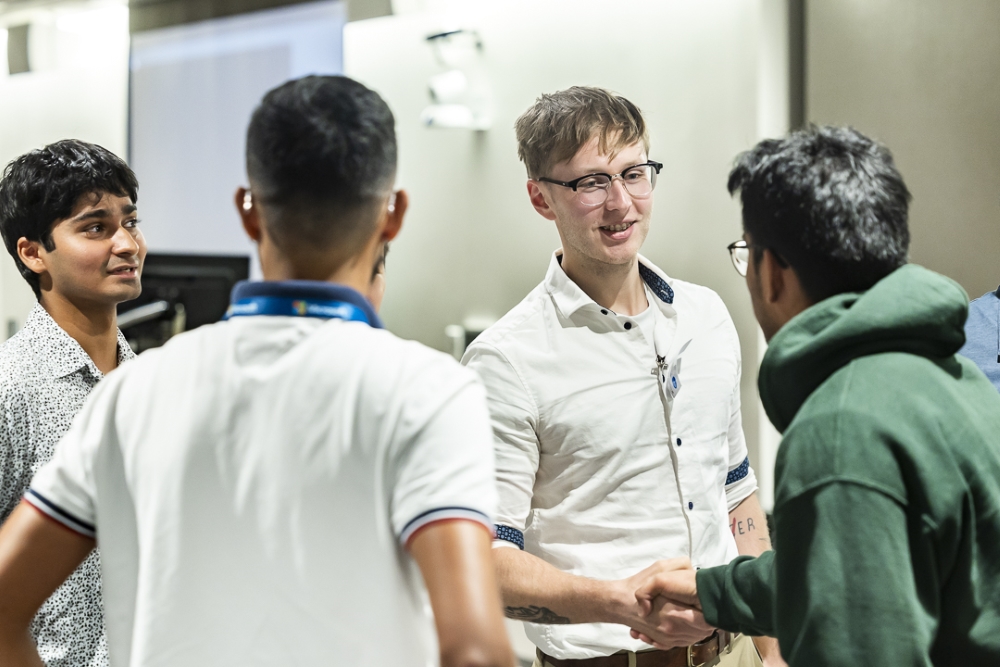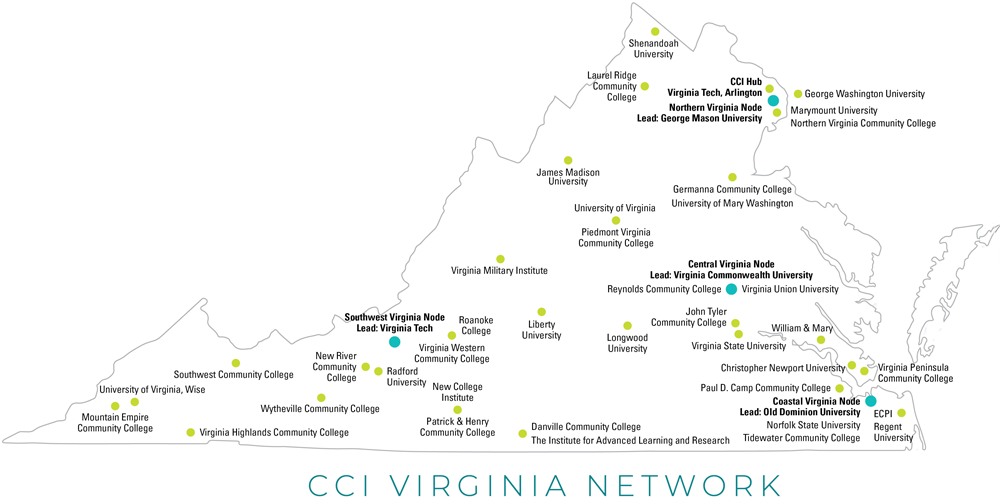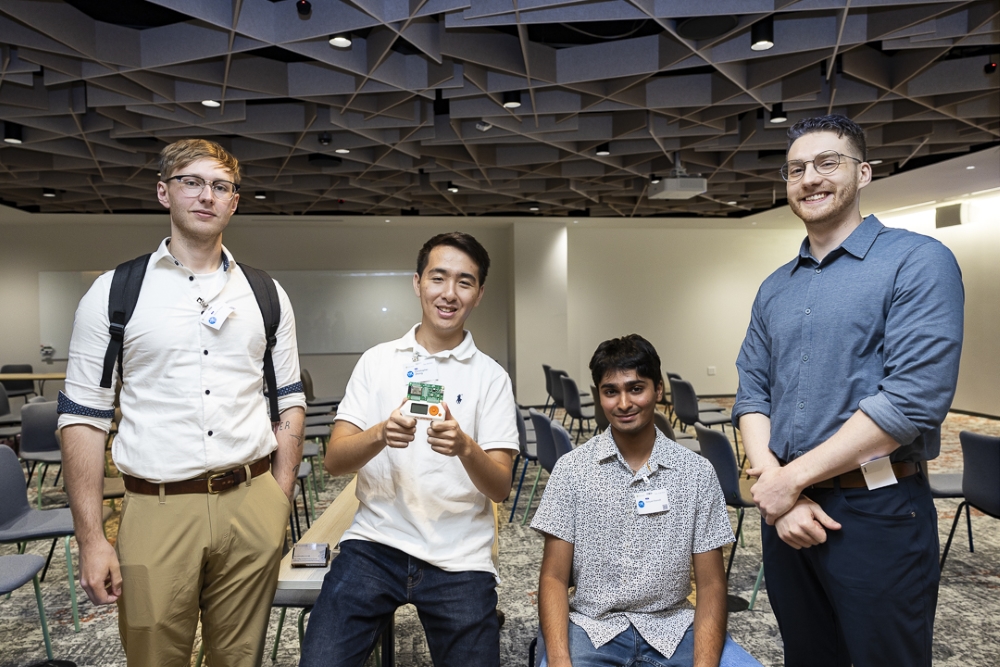Five years since the Commonwealth Cyber Initiative (CCI) was formed, 46 Virginia universities and colleges have become ideal hotspots for innovative cybersecurity collaboration and research.
Northern Virginia alone now holds 70% of the world’s active data centers, topping over 470 as of 2024. An estimated 50,000 cybersecurity jobs are currently open throughout the state, requiring an ever-evolving skillset that can make it difficult for new graduates to get a foot in the door.
Talent to support such activity, and more, has become a main focus that inspired the creation of CCI. Its mission to advance new research, workforce development and innovation makes direct industry engagement critical for students within the network. By bridging access between industry, economic development partners and higher education, the avenue to drive new opportunities to enter increases 10-fold.
“One thing that CCI has created is the critical mass to go after large-scale funding,” says CCI Executive Director Luiz DaSilva. “Virginia has very strong universities and colleges, so individual researchers tend to do pretty well in getting research funding, but there are some large-scale funding at the multimillion-dollar level that really requires a broad coalition in the critical mass to really be successful and that has made a huge difference.”
The initiative has now tripled the amount of cybersecurity research taking place across the state since 2020, drawing in $110.7 million in new research grants and contacts in its 2024 fiscal year.
“We’re seeing that in the last couple of years in terms of very large grants and contracts coming into Virginia, both from industry and from the federal government that I do not think would have been possible without that scale,” says DaSilva. “Our vision is to make Virginia a global leader in cybersecurity, to raise the profile of our institutions and the Commonwealth as a whole as the place companies can establish themselves and for students around the nation to come here and stay.”
Students who take part in research opportunities coming into CCI are able to participate in project-based learning which provides the experiential knowledge needed to land an internship or apprenticeship while in school. This first-hand experience also is more likely to help students secure a high-quality role upon graduation.
“There is now a community of cybersecurity students in Virginia across all the universities and colleges,” notes DaSilva. “I think that makes a big difference in terms of retention in cybersecurity and talent retention in Virginia as well.”
It has led global IT companies such as Microsoft to conduct their own cybersecurity research projects within CCI. In August 2024, the company and CCI wrapped a Flipper Zero project-based learning program in which five students took the hand-held electronic device to explore its ability to analyze and simulate wireless signals.
Flipper Zero can be used as a wireless universal remote control, which has sparked controversy as the product has the ability to hack into devices like remotes and garage doors. The program aimed to measure the device’s capabilities — information Microsoft will use to determine how to improve safeguards moving forward.

Students within the CCI network were selected to test capabilities of Microsoft’s Flipper Zero device in 2024.
Photos on facing page and above courtesy of the Commonwealth Cyber Initiative
Students from Virginia Tech, George Mason University, Christopher Newport University and Laurel Ridge Community College were selected through Microsoft’s own interview process. The students each set off to build their own case study for how the Flipper Zero can work, hacking into cars, home sensors and more. They then created their own unique project presentation for the company that provided answers to how the device can capture signals and whether these signals can be manipulated, replayed, disrupted or not.
“It turned out to be a huge success,” says DaSilva. “The students went above and beyond what was expected of them and were really able to experiment with the Flipper Zero to hack into everything. It was a fun project that led to a lot of learning, not only for the students, but Microsoft as well.”
The success of this project inspired Microsoft to work with CCI to develop a second project-based learning program that was set to launch before the end of the year. The value of creating this industry partnership is that students get direct mentorship from cybersecurity professionals.
Aside from a favorable business climate, reliable power and skilled talent, Virginia’s proximity to Washington, D.C., and U.S. federal agencies who require top cybersecurity safety measures yields the state a key advantage in becoming a top industry hub for the nation. This is supported by a growing venture capital ecosystem, which currently contributes 27% toward cyber security initiatives.
“This combination of federal government, federal contractors and the commercial industry, broadly speaking, I think positions us very well to be a leader for cybersecurity,” says DaSilva.
Amazon Bridges International Intelligence
In April 2024, Amazon and software company NVIDIA announced that the University of Washington and Japan’s University of Tsukuba would join forces to advance entrepreneurship, research, workforce development initiatives and social implementation within the realm of artificial intelligence.

This partnership follows ties the U.S. and Japan cemented in 2022, aimed at advancing international science and technology capabilities. The use of AI has taken center stage as the world looks to rapidly advance its knowledge in how this technology can benefit our digital transformation.
“We are honored to work with Amazon and NVIDIA as well as with the University of Tsukuba to advance artificial intelligence and global engagement,” said University of Washington College of Engineering Dean Nancy Allbritton. “Tsukuba is a science city just as Seattle is, and we see a tremendous opportunity to leverage the university and the whole ecosystem to create a better future on both sides of the Pacific.”
Over the next decade, the team will delve into ways AI can impact challenges associated with healthcare, robotics, climate change, atmospheric science and more, according to the university’s announcement.
Amazon will invest $25 million toward the partnership for four annual programs, which includes an annual call for proposals for AI research funding, targeted funding for post-doctoral and PhD fellowships for researchers, a 10-week undergraduate summer research program in the U.S. and Japan, and a three-week entrepreneurship bootcamp.
“These renowned universities — the University of Washington and University of Tsukuba — are known for their world-class research and education in AI and computing,” said Rohit Prasad, senior vice president and head scientist of Artificial General Intelligence at Amazon. “We are excited to partner with them and NVIDIA, and for the potential of this partnership to bring together experts across sectors, disciplines and countries to accelerate critical AI research, and nurture the next generation of AI talent and startup builders.”
Much like Amazon, Microsoft will additionally look to Japan to boost cloud computing and AI infrastructure, carrying a $2.9 billion investment in tow. The company will establish its Microsoft Research Asia lab, where it will aim to train 3 million people through AI upskilling.
In addition, Microsoft, semiconductor and software design company Arm and several Japan-based businesses will invest $60 million to bring together Carnegie Mellon University (CMU) in Pennsylvania and Keio University in Minato, Japan, to increase AI-focused research and workforce development, leveraging the success of both universities’ AI programs.
Research will cater to multimodal and multi-lingual learning, AI robotics, autonomous AI symbiosis with humans, life sciences and AI for scientific discovery, as reported by CMU. Microsoft will also invest $10 million between the two universities and additionally the University of Tokyo to further support AI research taking place in Japan.
“Establishing AI research collaborations and industry partnerships on topics that align so closely with the research that’s underway at CMU are essential for making progress in advancing the best possible impacts of AI on people’s lives,” said CMU School of Computer Science Dean Martial Herbert.

